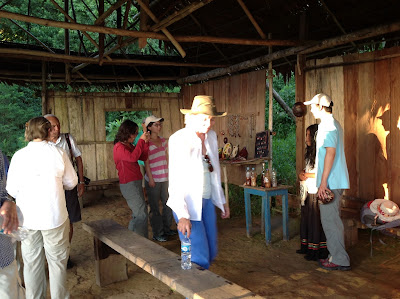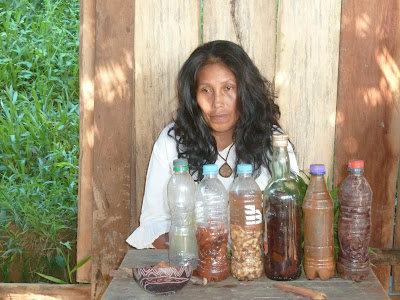One of the highlights of the trip was meant to be a visit to a Shaman. I had studied Witchcraft as a special paper for my final Social Anthropology Tripos at Cambridge and was keen to meet a real live Shaman in the Amazon. I have met shamans elsewhere and was keen to meet one here. Studying various tour group websites, you will find that many cruise groups visit a shaman as it’s an unusual event for most. On the way, our guide had told us shamanism that will help us understand the traditions of the rain forest people. It’s all about the spirit realm, paying a visit to a local shaman. Mystic ... minister ... healer—one might consider a shaman to be "all of the above". But as he said, to understand shamanism requires something of a leap of faith, a leap into the spirit world that is the shaman's domain.
To quote my Tour company leaflet – “Shamanism is practiced around the globe, and is universally distinguished by a trance state called shamanic ecstasy. In these "out of body" travels, the shaman enlists denizens of the spirit world to help him with a variety of duties, from healing the sick to assisting a deceased person's soul into the after world—and all the while, the shaman remains conscious. Before you leave the Amazon jungle, you'll gain rare insight into the complexities of this phenomenon when you meet an actual practicing shaman in a river village. He'll introduce us to his spiritual healing craft and tell us about rain forest plants that indigenous peoples have for untold centuries held to possess curative properties. Your experience may not be "out of body," but it's sure to be out of the ordinary”.
Well, it was interesting but for me at least not wholly
satisfying. It was a part of touristic ‘mumbo jumbo’ as we actually spent just
a short time there – whereas to get into the spirit itself and then do whatever
is required is actually a time consuming process. At San Regis village, we were
led up the mud path (having beached our skiff) to a large 30 ft x 15 ft room
which had benches along the wall. No furniture except a small table where the
shaman had her medicine bottles and another where she had handicraft items for
sale.
Her name was Carolla. For nearly 45 minutes, through a Q&A
session first with Robinson and then thru the group, she answered our
questions. The details are as follows - She is a 33 year old Cucama Cucamiga
Indian who also did farming apart from her tradecraft. If you look at her, she
looks aged! She was the only shaman in the region. She speaks the Usupaki
dialect along with Cucama which is what the guide used. She was chosen through
a ceremony by her master who was her grandfather who said that she had an aura
and the vision to be a shaman and will also teach others the trade. She has three children and her husband looks
after them. What really struck me about
her was her incredibly sad face and attitude. She did not radiant any
confidence for a patient, in my view, and her voice was a high pitch especially
when she was chanting at the end
of the session.
 When she is needed, she gets into the role by having a good smoke.
She took out a local cigar and lit it to show us! She feels the pulse of the
patient as well as the head. She can remove simple cysts without an operation. When
in her tobacco induced trance, she has a vision which tells her what medicinal
plants to use. She does not charge the patient but they are free to give her
gifts, e.g. vegetables, fish etc. There are no western medicine doctors there. She
does not do surgery, but can treat cholesterol, diabetes, snake bite, arthritis
and other most common ailments.
When she is needed, she gets into the role by having a good smoke.
She took out a local cigar and lit it to show us! She feels the pulse of the
patient as well as the head. She can remove simple cysts without an operation. When
in her tobacco induced trance, she has a vision which tells her what medicinal
plants to use. She does not charge the patient but they are free to give her
gifts, e.g. vegetables, fish etc. There are no western medicine doctors there. She
does not do surgery, but can treat cholesterol, diabetes, snake bite, arthritis
and other most common ailments.
She looks after nine communities in this area and is available at
any time for those who need her. She believes that smoking the tobacco brings
good spirits from the forest. Carolla makes her own medicines – every plant has
a spirit and before plucking a leaf she takes the permission of the spirit. She
uses snake fat as part of the concoction. She has nothing written down and
hence she is keen that her students lean the trade from her.
We were sitting in the ceremonial house where she does ceremonies
three times a week. Medicine is considered as a purgative. The ceremony is
called AYAWASA – where she gets her vision. The Ayawaska bark is cooked for 8
to 10 hours. Each concoction is 3 to 4 oz shots = which she claims is equal to
30 cases of beer!! I find this hard to believe but I noted it nonetheless.
In the past, shaman were only men but now women have joined the
trade. Granddad said that women are more dedicated and don’t give up. She has
never had a complaint about her work from anybody.
The main plants she uses are
1)
Resin sap of Sangre de gado. For mosquito bites, itches, gastritis.
One of our
2)
group immediately told her
of the bites she had on her leg and Carolla gave her the med which stopped the
itching!
3)
Ayahusca – clove wine
4)
Klabowska for rheumatism , muscle pain,
5)
Lebanto te lasaro – local Viagra!! Good for women for getting
pregnant.
6)
Kalabasca wood – incl wild ginger for hair fall, colic
7)
Kumaseva from tree bark –
bleeding, prostate
All of these medicines are taken with sugar cane juice.
 |
| Distributing the red bead to each of us |
After she had finished explaining her procedures, she gave each of us a small red bead which we kept in our left palm. She started her cigar and blew a whiff of smoke into each palm.

 After
that was over, she then took a fan made from leaves and started her chant.
After
that was over, she then took a fan made from leaves and started her chant.She went to each person in the group and chanted some blessing above our head waving the fan on her cigar to create some smoke whilst we sat with bowed heads and ran our palms over our hair -- as a sign of purification??

The ceremony being over, she then thanked us for coming. No money was exchanged. Instead if we wanted, we could buy some locally made stuff from her. I bought a carved coconut shell and some bead bracelets.
 We
all returned to the mother ship, each in our own mind thinking of this rather
strange experience. As I said, I had prior knowledge of such practices, so to
me it was just a tourist experience and not the real shaman trance. But fun
nonetheless as I saw it as part of the Amazon experience.
We
all returned to the mother ship, each in our own mind thinking of this rather
strange experience. As I said, I had prior knowledge of such practices, so to
me it was just a tourist experience and not the real shaman trance. But fun
nonetheless as I saw it as part of the Amazon experience.  |
| This is a half coconut which has an etching of a parrot and leaves on it. Then coloured. Traditional design. |
Text and photographs copyright of the author. No part of this article or photographs maybe transmitted or reproduced by any means, electronic, mechanical, photocopying or otherwise, without written permission. Do contact the author on email -- helpthesun@gmail.com







No comments:
Post a Comment
Text and photographs are copyright of the author. No part of any article or photographs maybe transmitted or reproduced by any means, electronic, mechanical, photocopying or otherwise, without written permission. Do contact the author on email -- helpthesun@gmail.com